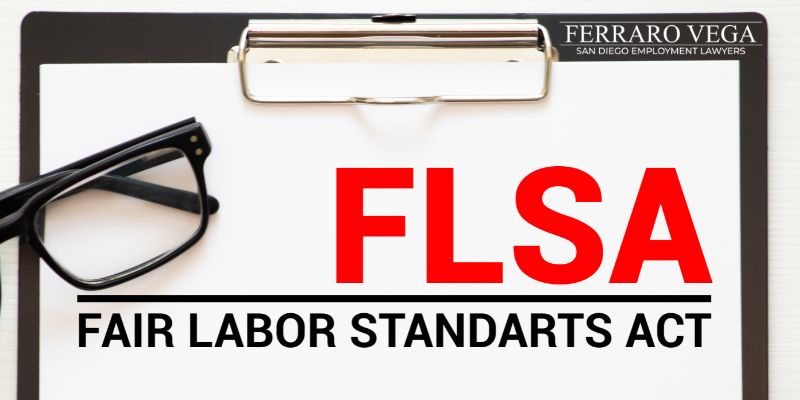Home \ Labor Class Actions
Fair Labor Standards Act FLSA Collective Action Attorney

Although many people love what they do, most employees are just trying to earn a living. Unfortunately, some companies attempt to shortchange their employees by not giving them the compensation they are owed. If you feel disadvantaged by your employer’s actions, consider scheduling a consultation with a Fair Labor Standards Act (FLSA) collective action lawyer to understand the options available to you.
Effective and Targeted Representation
The team at Ferraro Vega San Diego Employment Lawyers has an extensive background in a wide variety of employment law issues, including those involving the Fair Labor Standards Act, Fair Employment and Housing Act, and more. They have helped clients in virtually every industry with claims about wages, hours, discrimination, wrongful termination, and other employment-related matters.
Whether your employer is a small firm or a Fortune 500 company, Ferraro Vega San Diego Employment Lawyers is willing to work with you to discuss the possibility of a claim. Although we are a California-based law firm, we have represented clients in almost every U.S. state, including Texas, Arizona, Florida, Washington State, Colorado, Georgia, California, New Mexico, Oklahoma, North Carolina, South Carolina, Georgia, Louisiana, Virginia, and Michigan.

What Is the Fair Labor Standards Act?
The Fair Labor Standards Act was created by the U.S. government to protect the rights of employees. This act defines several different aspects of employment, including:
- Minimum Wage: While the federal minimum wage is $7.25 an hour, employers are usually beholden to a state minimum wage law that is higher than this. Most employees are allowed to talk about their earnings with others as well as receive their pay stubs to check for accuracy.
- Overtime Pay: Hourly employees are entitled to 1.5x their standard amount of pay if they work over 40 hours in a typical work week.
- Other Tasks: Employers must pay employees for the entire time that they are at a workplace performing work-related tasks, including making preparations before and after the work day.
- Effective Notice: Employers must inform their employees of FLSA regulations by posting information about them in a conspicuous place. They must also keep a record of the hours that their employees work and how much they are paid.
- Employment of Minors: Individuals under the age of 18 are subject to additional laws to protect their development. Employers must follow these specific laws if they have employees under 18.
Why Do I Need an Attorney?

It can be difficult to get your due compensation from an employer as an individual, but an effective legal team can help emphasize your demands. Some issues might be resolved with a simple complaint, while others might require bringing the employer to court. Most employers are equipped with a large legal team, so it can be helpful to have your own professional representation by hiring an FLSA collective action lawyer.
Who Is Exempt From Wage and Hour Laws?
The laws in the Fair Labor Standards Act do not apply to certain individuals, including:
- Executives: An employee is considered an executive if they are paid more than $684 weekly and primarily manage other employees as their main job duty. They must also own more than 20% of the business and be able to make major decisions regarding employees, like whether to hire, fire, or punish an employee.
- Administrative Workers: An administrative worker must also make more than $684 weekly and use their own skills and opinions to perform their work tasks. They usually work directly for a company and participate in some kind of office work.
- Professionals: Employees who are professionals in a field of science or higher education and perform tasks that require an advanced level of knowledge are considered professional employees. They can also be in a creative role and make works of art or engage in other forms of creative work.
- High-Compensation Workers: If an employee makes more than $100,000 a year and performs tasks that are similar to an executive, administrative worker, or professional, they are also exempt from the FLSA.
- Salespeople: Employees whose main job is to sell products away from a company’s office are usually considered exempt from the FLSA and work on a commission basis.
- Computing Industry Employees: Certain employees in the computing industry who make $684 per week or more are also exempt from FLSA protections. This exemption mainly deals with job functions. Exempt individuals must work on developing computer programs or systems or applying them to real-world situations.
- Other Workers: Employees in specific industries, usually those that vary in the amount of work available during the year, might not qualify for FLSA protection, including:
- Theme park or other recreational workers
- Local newspaper employees (with less than 4000 papers being circulated)
- Ship workers on foreign vessels
- Small-farm employees
- Domestic workers if they are paid less than $1000 per employer per year or work less than 8 hours per week per employer.
- Apprentices (although some states still require apprentices to be paid a specific minimum wage)
- Independent Contractors: Since independent contractors are not considered employees, they usually are not protected by FLSA requirements. Some states have specific wage requirements for independent contractors.
Common FLSA Violations
While this list is not exhaustive, there are some common issues that arise in workplaces regarding the FLSA, including:
- Exemptions: Some employers assume that their employees are exempt from FLSA requirements when they are not and do not provide them with the protections outlined in the act.
- Time Theft: An employee should be paid for the entire time they are expected to work on company premises, including the time it takes to prepare for a shift on location. Making employees clock in a significant time after they have started working is a common form of FLSA violation.
- Wage Theft: If an employee’s time worked is not properly recorded, then they might not be receiving the pay they deserve. This could be an even greater issue if they are working enough hours for overtime pay but are not being compensated for it.
- Breaks: If an employee is given a 5-20 minute break, that should be considered work time and factored into their weekly hours worked.
- Other Tasks: Some jobs require employees to work off the clock to complete training, answer emails, or attend meetings. If an employee is non-exempt, then they must be paid for these activities, even if they are not technically on the clock.
If any of these behaviors are familiar to you in your workplace, contacting a wage and hour lawyer can help you determine if your employer is violating the FLSA.
Benefits of a Collective Action
If you have a specific grievance against your employer, it could be tempting to file a claim individually. However, there are some benefits to filing a collective action as opposed to simply filing as one person:
- Authority: While this is not a concrete rule, your case can look more credible if other employees also have grievances with the company.
- Larger Punishment: If your employer is behaving in a truly egregious way, a collective action can award more damages from your employer to increase the likelihood that the behavior won’t happen again.
- Saves Resources: Instead of every employee needing to find legal representation, one attorney or group can represent all the employees at once. This can save significant time, money, and effort for everyone involved.
If you have a particularly strong individual case or think that others might have weaker cases than you, it might be more effective to file individually. Contacting a labor lawyer can help you determine whether a collective action claim is right for you.
The Collective Action Process
FLSA violation claims typically have a statute of limitations of two years. This means that you have two years from when you either suffer the consequences of a violation or realize that your employer committed a violation. If the employer knowingly violated the FLSA, the statute of limitation is extended to three years. Here is a general guideline for the steps that most people take during the FLSA collective action claim process:
- Contact Others: Work with employees who are either in a similar job role or are paid in a similar way as you are. Ask them about their experiences and discuss the possibility of starting a collective action. Employees who qualify for a collective action might not have a similar job title but perform similar job functions. It is also helpful at this stage to gather as much evidence as possible that the employer violated the FLSA.
- Certification: If a group of employees is interested in forming a collective action, an attorney can help them develop a case for the court to review. The court reviews the case and determines whether it has legal merit. Once one person’s claim is approved, other employees can sign on as additional plaintiffs for the collective action.
- Discovery: After the collective action is formed, the employer’s legal team is notified. Both teams have time to gather evidence to prove their side in the case. Evidence includes pay stubs, records of employee hours worked, and other supporting documents.
- Decision: Once the discovery phase is over, the court reviews the case again and determines whether the case should be admitted to court. The court sometimes decides that the case is not strong enough as a collective action, which requires each individual employee in the collective action to file their own claim. If the claim is considered valid, a judge and jury evaluate it in a court of law.
FLSA collective actions can take a significant amount of time to complete. It can take months or even years for a complete resolution. This is why it is so important to contact a wage and hour lawyer as soon as possible to ensure that you have enough time to properly file your case.
FAQs
Q: Who Is Not Covered by the Fair Labor Standards Act?
The FLSA only applies to workers who are employed by companies that either:
- Make $500,000 in annual sales. This means the amount sold without taking into account the profit made on those sales.
- Engage in commerce across state lines. This applies to companies that have multiple locations nationwide, use the U.S. mail system, or even accept nationwide phone calls or emails
Most companies are subject to the Fair Labor Standards Act, with a few exceptions.
Q: What Is a Collective Action Under the FLSA?
A: A collective action is similar to a claim made by an individual, but collective actions also apply to other employees in addition to the one who filed the claim. This is somewhat similar to class action claims, but those affected by a class action do not have to be involved in the litigation. Individuals affected by a collective action claim must officially join the case to benefit from it.
Q: Which Employment Practices Are Regulated by the Fair Labor Standards Act?
A: The Fair Labor Standards Act was created alongside the Wage and Hour Division of the U.S. Department of Labor in 1938 to ensure that employees were getting appropriately compensated for their work. The act regulates employment aspects like minimum wage, overtime pay, documentation of records related to the FLSA, and how individuals under 18 must be treated in the workforce.
Q: What Is a Possible Consequence of Violating the FLSA?
A: Specific consequences for violating the FLSA depend on what part was violated. Employers found to be violating overtime pay or minimum wage requirements can be fined up to $1000 per violation. Employers violating child labor laws can be fined up to $10,000 for each minor the employer treated in a way that violated the FLSA. If the employer was found to be willfully violating the FLSA, they might face criminal charges and up to a $10,000 fine.
Understand Your Rights
Standing up against your employer can be scary, but it’s possible with the right legal team. Schedule a consultation with Ferraro Vega San Diego Employment Lawyers to learn about how you might be eligible to file an FLSA claim. Although our office is in San Diego, we have experience representing clients all across the United States in their FLSA collective action claims.
